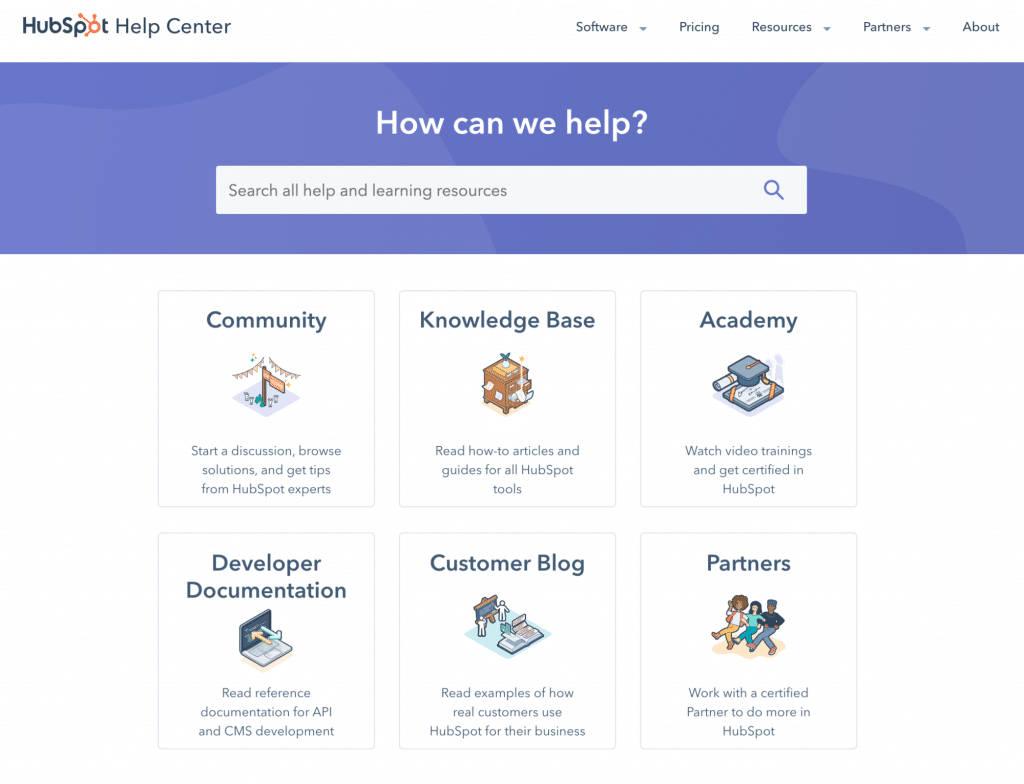There’s no doubt about it: investing in B2B customer service is one of the smartest moves a business-facing company can make.
If you’re happy to take our word for it without explanation or elaboration, you can skip to the tips and start working on it right away.
But maybe you need some convincing first. And given the title of this post, there’s a solid chance you’re looking for some information. If so, you’re in the right place.
In this guide, we’ll cover the basics of B2B customer service, get to those tips for nailing it, then list some companies that have really made it work for them.
Let’s get started.
How is B2B customer service different from B2C customer service?
Why B2B customer care is so important
B2B customer service best practices
B2B customer service examples from real companies
⭐️⭐️⭐️⭐️⭐️ Ready to offer 5-star customer service? Get strategies for every stage of the customer journey with this free eBook.
What is B2B customer service?
B2B customer service works to keep business clients and increase their lifetime value by efficiently resolving their issues and answering their queries. Handled well, it leads to strong working relationships, lucrative upsells, and even business referrals.
A B2B customer service team will look similar to a B2C customer service team, consisting of trained support agents monitoring all provided support channels, but there are some major differences that we’ll cover next.
How is B2B customer service different from B2C customer service?
To understand the difference between these two categories of customer service, we must first recap the distinction between B2B and B2C:
B2B (business to business) covers selling to companies, while B2C (business to consumer) covers selling to individuals. The biggest practical difference is scale, with B2B sales typically being much larger and involving long-term commitments while most B2C sales are small isolated purchases.
All the retail products you’re used to (breakfast cereals, concert tickets, iPhones, etc.) are B2C products, marketed and sold to everyday consumers in modest quantities.
And then there are B2C services, such as car servicing or hairstyling. These tend to be quick and transactional. Find what you need, pay for it, and you’re done.
B2C buyers don’t tend to have much brand loyalty. To varying degrees, they simply want quality, features, and low prices. They’ll have go-to buys, but be easily swayed by catchy ads (e.g., “I’m lovin’ it”) or the sheer novelty of new brands on the shelves.
The B2B world is very different. B2B buyers tend to operate with strict requirements uniquely shaped by the businesses they represent. They care about price to some extent, but they care more about reliably meeting their business needs well into the future, and will generally pay more for the privilege.
And while a B2C sale can take 30 seconds, a typical B2B sale can require legal teams, complicated contracts, and the negotiation of service-level agreements (SLAs).
Given all that, here are the key customer service differences:
1. B2B customer issues are more complex
When an individual buyer contacts a B2C brand’s customer service, it’s likely for something simple like requesting a refund for a damaged item or getting an update on the return status of a shipment.
Handling that sort of issue is fairly straightforward and can be done through almost any communication channel (email, live chat, phone, etc.). It also doesn’t usually require the creation of a support ticket.
In the B2B world, though, the customer service process is a little more complicated.
This is because most business-to-business customer service requests tend to be more pressing, more technical, and more important to the companies fielding them.
The scale of B2B purchases means that a problem with one can easily demand immediate attention from an attentive and skilled support agent, and it’s hard to address such an issue through something like live chat. Phone calls are vital (even in an increasingly phone-averse world).
A B2C company can afford to disappoint one customer—although, they obviously wouldn’t aim to—as that person’s custom won’t mean that much overall. But a B2B company can’t do that, as a single customer could account for a huge portion of its business.
Overall, this means that the B2B customer service process needs to be much higher quality than its B2C equivalent.
2. B2B support engagements involve more people
In the B2C domain, a typical support issue involves just two people; the customer service agent and the person seeking assistance (usually the customer).
In a B2B environment, though, it’s common for one call to end up involving numerous people.
Maybe the person asking for help isn’t the person who made the purchase, and the buyer must be consulted to confirm what they asked for. Maybe the call concerns an ongoing issue initially reported by someone from another department and dealt with through the combined efforts of several other support agents.
This hugely raises the importance of customer service teamwork. Agents must work together to thoroughly document calls and ensure customer experience consistency by backing one another and delivering matching messages.
Pro-tip: Use a contact center solution that connects with other important customer service software in your business (like your CRM or sales apps). This way, you can funnel customer questions coming from every channel (phone, email, and social media) to one place.
3. B2B customer relationships are deeper
The extended nature of B2B deals requires B2B support staff to speak to the same people over and over again, allowing them to form strong customer relationships.
Indeed, while it’s very rare in the B2C world, it’s perfectly normal for a B2B service rep to be on a first-name basis with most of the people they support.
B2C brands like to use first names as well, but mostly through automated personalization in their marketing materials and support messages. It’s highly uncommon for the same B2C support agent to talk to a customer twice.
This results in B2B support teams prioritizing different skills. A good B2B rep will pair their issue-resolution skills with personality and empathy, keeping their customers content by learning how they tick and knowing how to deal with them effectively.
4. B2B teams take longer to resolve customer issues
And no, it isn’t because B2B support teams drag their feet or just don’t know what they’re doing. It’s because B2B business services encounter tougher issues and it’s really important to ensure they get resolved perfectly.
Firing off a dismissive stock answer might be acceptable when a B2C buyer requests an order update, but something like that could seriously damage a B2B relationship.
B2B agents need time to do their homework, follow protocols, run tests, confirm compliance, and document everything exhaustively. These tasks really add up.
This can prove frustrating for B2B companies when they’re trying to achieve excellent First Call Resolution (FCR). B2C brands can speed through resolutions, but B2B agents have so much more to do, so their companies must invest in additional measures for improving FCR (with the most important being giving agents the resources they need to get things wrapped up effectively and quickly).
Why B2B customer care is so important
We’ve already touched upon some of this, but here’s a summary:
B2B customer care is vital because B2B customers are costly to replace and can return remarkable long-term value if treated well. Satisfied B2B customers can also deliver lucrative new business through referrals.
B2C customer service is also important, of course, but not in the same way because it only needs to be good on aggregate. Customer experience in B2B needs to be good every single time or risk alienating a huge client.
If you run a business-to-business service, then, you should be paying close attention to the quality of your customer support system. If your B2B service management is anything less than superb, you’re subjecting your company’s financial stability to unnecessary risk.
B2B customer service best practices
B2B services are all somewhat different, so B2B support systems must also vary, but that doesn’t mean there aren’t commonalities among excellent examples. The following are some core best practices to keep in mind:
1. Know your customers inside out
B2B customer service is relationship-driven. You’re playing the long game here. To really master B2B customer service, you have to build a solid rapport with everyone on your account and use that familiarity to offer personalized solutions.
Unlike in the B2C space, B2B customer service teams are always dealing with professionals or experts from other industries. Remember that your B2B clients are technically savvy, data-obsessed, and have their own customers to cater to.
Build a customer-centric strategy and support culture that positions you as a partner in your customers’ growth and success. Offer them technically superior, contextual, and long-term solutions that’ll help them achieve their own business goals.
2. Encourage effective support collaborations
Each B2B customer has a unique set of problems to solve, and this impacts the calls you’ll receive. One day, you might need to help with a housekeeping issue like managing software performance. Another day, you might get a complicated question concerning resource scaling.
To handle the variety, you’ll need to find ways to facilitate and support cross-functional collaboration by making it easy for all your subject-matter experts (and all the relevant members of your clients’ teams) to get involved.
For example, you might invest in a collaboration tool for your contact center to automatically sync data from your customer relationship management (CRM) software to your helpdesk app, giving all teams easy access to customer data.
That means no more requiring support agents to email or message one another to find out answers to simple questions like “When did this customer last contact us?” or “What product did this customer purchase from us?”.
Keep in mind that maintaining a strong collaboration hub is key to providing a uniform and personalized customer experience to each customer, regardless of where they are in their purchasing journey.
You might also want to deploy software that establishes a central dashboard for your online customer service support channels, as this will make it much easier to track support requests flowing in from different channels (live chat, social media, etc.).
3. Sign SLAs, especially with large clients
Not all B2B customers are created equal.
Some have service requirements that are more complicated than usual, such as government entities that need on-premises solutions for security reasons.
Others might have compliance-related issues, such as healthcare companies that require HIPAA compliance.
If you use a first-come-first-served support model, you can’t prioritize any particular clients. You can only help whichever client is next in line.
But that isn’t the only way to operate. You can instead have a prioritization system established through service level agreements (SLAs).
SLAs are somewhat like prenuptial agreements. Each one describes agreed terms between you and a specific client, covering the services you’ll offer them (including support) as well as your respective responsibilities and availability.
If you sign an SLA before you enter into a sales contract, it’ll set clear expectations about your support capabilities and limitations.
And having a full battery of SLAs can help you prioritize your support tickets based on your support bandwidth and the complexity and severity of the issues.
4. Create helpful self-service options
Yes, B2B customer issues tend to be relatively complicated, but they don’t always need to demand much of support agents. Many companies have in-house experts readily available, so some of your clients might be prepared to solve their own technical issues given the chance.
By offering self-service support options and information, you can empower your clients to handle some issues quickly and easily. For example, you could build a support page with frequently asked questions (FAQs), product documentation, how-to guides, video tutorials, and knowledge base articles.
Self-service support has multiple advantages, not just for your clients but also for your business. It’s a form of automated customer service that’s always-on and scalable, making it potent for B2B customer service (especially because it can take a huge load off of your team when it comes to technical questions).
Pro-tip: If you have good self-service options, it can help your contact center team run more efficiently and focus on the complicated questions that absolutely need human assistance to resolve.
5. Make your customer service proactive
When it comes to business success, the future is in the hands of brands that don’t simply wait for their customers to reach out with concerns or queries.
Think of any B2B brand that’s dominating its niche, and pay attention to what makes it better than its competitors. In all likelihood, it isn’t just offering better products and/or services, it’s also taking the initiative when it comes to support.
Periodically contacting clients to see how they’re faring and whether they need any assistance is a fantastic way to improve B2B customer engagement and thus outperform rivals in today’s hyper-competitive market.
For most B2B brands, it can lead to higher customer lifetime value and increased customer retention. It’s also great for creating customer feedback loops that uncover small issues so you can deal with them before they snowball into big problems.
This is why so many companies in the B2B space now maintain customer success teams. Going the extra mile to deliver value rarely fails to generate great ROI.
Some B2B brands are also adjusting their traditional sales practices by looking for more ways to drive revenue from existing customers. Someone who’s already had a satisfactory B2B customer experience with you is more likely to buy from you again.
So, don’t be reactive and wait for your customers to come to you with complaints. By then, they’re already frustrated. Instead, empower your customer service team to start interactions well by actively looking for opportunities for your business to improve the customer experience.
B2B customer service examples from real companies
A great way to come up with ideas for your B2B customer experience management is to learn from companies that already offer excellent B2B client services. Here are some companies with service departments worth examining:
1. PipelineDeals
PipelineDeals, the company behind the popular Pipeline CRM software, has been one of the fastest-growing B2B brands in the US since its establishment in 2006.
Those are particularly impressive numbers when you consider that the CRM software field is a crowded one. Despite operating in such a tough environment, PipelineDeals has made it to the annual Inc. 5000 list on numerous occasions while winning a series of awards.

So, what’s the secret recipe to the success of PipelineDeals? The magic lies in the uncompromising quality of customer service it offers.
By the way, PipelineDeals is a fully bootstrapped company, and half of its employees work remotely—including the support team.
PipelineDeals realized the value of team communication and collaboration during its early days of growth. And because most of its customers prefer calling its support service, it uses RingCentral’s cloud phone solution to make sure there’s a human in place to attend each call no matter what time or day it is.
It also uses RingCentral’s platform to train and onboard new reps, loop in experts from other teams in live calls to address customer issues, and pull reporting data to monitor and improve agent performance:
“A big part of our value proposition is that, as a customer, you’ll always be able to reach a human when you call us,” explains Paige Thomas, the company’s Customer Care Manager.
Thomas also says that RingCentral helps her remote support team stay on top of each customer issue, even if they’re on the road or not in the same country.
2. Qumulo
Qumulo is a B2B company that lives in the small niche of enterprise data storage.
But while most people haven’t heard of Qumulo, Qumulo’s customers love the brand to bits. And it’s easy to see why.
For starters, every Qumulo customer gets a dedicated Customer Success (CS) rep. The brand believes that by offering proactive help and support, it creates a kind of magnetic field around its customers to attract more customers. A very interesting concept.
Qumulo also invests in a whole spectrum of communication channels such as its customer care team, an online community, and a cloud-based monitoring platform that lets customers send real-time data automatically to Qumulo’s CS team.

Its native-built cloud-based monitoring platform provides one of the most innovative customer service cases we’ve ever seen.
Basically, it kicks into action when a Qumulo customer enables the cloud platform to send automated Qumulo-related data to the CS team. In turn, the CS team gets in touch with that customer if they see an issue so they can fix it before a support ticket even needs to be created.
This approach also allows the Qumulo team to proactively observe how customers are using their product and use that information to improve their B2B client experience.
3. Hubspot
While HubSpot is world-famous for its inbound marketing strategies, not a lot of people know that its customer service is equally awesome, exemplifying many B2B best practices.
HubSpot offers some of the most high-touch customer support among all B2B brands. Its proactive support is present in every interaction you have with its brand, whether you’re engaging with product pages, software, or mobile apps.
By encouraging customers to make the most of its easy-to-use products, HubSpot increases their dependency on its brand and earns them as fanatic lifelong users.
What’s incredible about HubSpot is that it makes B2B customer service look so easy. For one, it’s gamified support by offering online courses, product training, and HubSpot certifications.
That means being knowledgeable about using HubSpot products earns people some bragging rights in their professional circles, all while the brand takes a load off its customer support and delegates it to these newfound “product evangelists.” Genius.

HubSpot’s customer-centric vision flows directly from HubSpot leadership. Here’s what Brian Halligan, HubSpot’s co-founder and CEO, has to say on the topic:
“If B2B companies want to get ahead of the game, they are going to have to get rid of all the friction in their business to better attract, engage, and delight customers… [In the past] your product needed to be 10 times better than the competition’s. Now, your customer experience must be 10 times lighter than the competition’s.”
Give B2B customer service its due credit
B2B customer service can sound dry by B2C company standards.
It’s also more difficult to please B2B customers. It takes more than just a five minute chat with customer service to resolve a complex B2B issue, and that sort of complexity isn’t exactly uncommon in the B2B world.
But if you can get B2B customer service right, you can give your business an advantage that defends you against cutthroat pricing from competitors, minor mistakes, and so much more.
It’ll also help you raise your profits and those of your customers’ businesses.
And that’s the single biggest reason why B2B customer service is worth doing well.
B2B customer service FAQs
What makes B2B customer service distinct from the B2C variety?
B2B customer service differs from the B2C alternative in a number of ways. Issues are typically more complex and often involve more than one stakeholder at the client business. The successful resolution of one issue, too, is often more valuable to the B2B company.
Why is it so important to get B2B customer service right?
B2B operations are typically relationship-based. The B2B companies that excel are those which build long-lasting, trust-based relationships with their clients. Such relationships are not possible without great customer service and support.
Originally published Jun 30, 2024, updated Jul 05, 2024





